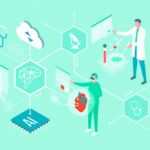AI operates via meticulously crafted algorithms—essentially a series of if-then-else decisions executed at incredibly high speeds. These algorithms allow machines to learn from data and make predictions or decisions, mimicking human-like cognition, but lacking true consciousness.3
Perhaps because AI looks so human but is not human, we view it with great reverence. Yet this reverence is not deserved. We humans need to demystify AI so we can set realistic expectations for its capabilities and limitations, ensuring that AI is viewed as a tool rather than a solution in itself.
The reverse is true too. Rodney Brooks, a prominent researcher and computer scientist once quipped, “Every time we figure out a piece of it, it stops being magical; we say, ‘Oh, that’s just a computation.’” This sentiment is vital in rheumatology, where we generate diagnoses as if by magic. We can use artificial intelligence to approximate that diagnostic process, but it’s not the same sort of magic that comes with an aha moment. It’s precise calculation, which no doubt enhances patient care but cannot, at least at this point in time, replace the nuanced judgment, empathic connection and personalized care provided by a skilled rheumatologist.
Applications & Limitations
AI’s foray into rheumatology and medicine at large has been cautious yet promising. Current applications, such as AI-powered dictation tools and automated letters for prior authorization, aim to streamline administrative burdens, allowing rheumatologists more time to focus on patient care. However, the use of AI in direct diagnostic processes and treatment planning is still in its infancy, challenged by such issues as data quality, algorithmic bias and the complex nature of autoimmune rheumatic diseases.
Moreover, with AI, we are asking computers to solve problems that humans have made. No cosmic law stipulates physicians and other healthcare team members must spend as much time documenting outside clinic as we do spending time with patients.4 We humans have placed these regulations on ourselves. Only we humans can undo these harmful acts through dedicated advocacy and collective action. The computers can make us feel somewhat better, but all that AI is doing is streamlining an incredibly broken and bloated healthcare system.
The closest historical analog I can think of is the introduction of the electronic medical record. It was supposed to be a panacea, but a good 20 years after implementation, we find it only reinforced the worst habits of our healthcare system and disempowered patients and clinicians at the expense of large organizations and their administrators. Just like then, we see two competing visions of the future: one that is boundless with possibility due to machines extending our capacity to do good, while the other binds us to machines so that we can enhance our productivity for others.



